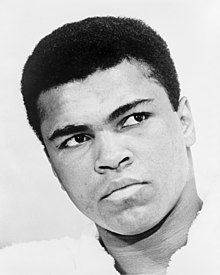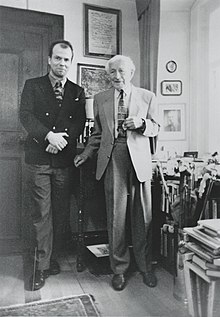Paper weight (novel)
Paper weight is the second novel by Stephan Reimertz . The first edition was published on January 1, 2001 by Luchterhand Literaturverlag , Munich , and in the same year as a serial novel in the Neue Ruhr Zeitung . The subject of the book is the relationship between family and the public in the context of social violence . The generational novel combines elements of the social and detective novel . He reports on the struggle for survival of a gifted child in a cold, brutalized home in West Germany in the early 1970s and the parents' attempts to murder their own child . Linked to this in many ways, a second level of action depicts the boxing match between Muhammad Ali and Joe Frazier in March 1971, the so-called Fight of the Century . The novel is considered a portrait of West German society in the 1970s in its Americanism and its inner emptiness.
action
The novel describes a milieu of the upper middle class in the FRG in the early 1970s and its mental and psychological neglect. The main strand of the narrative unfolds on a single day in March 1971. Flashbacks flicker in between . There is an atmosphere of diffuse threat over the plot. The father, chief physician in cardiac surgery , wants his grandmother to pay for the grandparents' inheritance intended for his son Oliver, the first-person narrator . He and his wife have been looking for it for a long time. The father claims to need it for a planned clinic. The grandmother refuses. In order to get hold of Oliver's legacy, the parents want to get rid of their child by giving it to the doctor who has already promoted the grandfather to the afterlife through malpractice . As a reflection of social violence, the book portrays the first fight between Muhammad Ali and Joe Frazier in Madison Square Garden , in which the boy takes a strong interest. The book ends with a doppelganger motif that summarizes and intensifies the plot: Oliver fights with an unknown boy who could be himself, the father or a messenger of death.
people
The novel illuminates the inner world of the FRG in the early 1970s and is at the same time a study of the survival of a child in an extreme situation . The parents utter only phrases and stereotypes . They are babblers whose words keep glimmering their murderous intentions. Both the father and the mother are all part of the field of psychopathology and at no point indicate behavior that could be classified as psychologically normal.
The father
The father is depicted as an empty narcissus who steals the words and gestures exclusively from advertising , film and television . Without any intellectual life of his own, he shows traits of a narcissistic personality disorder and is permanently trumpeting or resentful towards his family. The fact that he is a heart specialist is as ironic as the words of his son: "He was a gentleman."
When the father is introduced with the swimming figure Dead Man , this already indicates his end, which overtakes him in the swimming pool. Ironically , the parents' attempts to murder the narrator are also reflected back on them. The parents give the boy treatment to the very doctor who killed his grandfather by gross malpractice . The neighbor, Mr Blömeke, whose wife Marika the narrator Oliver desires, also becomes a "dead man" in the father's clinic. Oliver suspects that his father killed him while targeting the neighbor. At the same time the boy fears the revenge of the "dead man" because he himself desires the neighbor. When the son says of his father: "You live dangerously in his hospital", this is all the more true of Oliver's own situation in his parents' house.
The mother
Like the father, the mother is a character mask marked by inner emptiness and cynicism , without its own personality and without any empathy . It corresponds to the constant irony of the novel when she says sentences like: "You mustn't forget the elderly and the sick!" Or: "You must finally learn to think socially!" Again and again she reveals her murderous intentions . She is an intriguer and sadist who ceaselessly insults, mocks and puts down Oliver. She often falls into sheer hatred : "You wouldn't have been born today."
She compares her own child to murderers and criminals , but tries to kill him herself. At the end of the novel, she reveals that Oliver is an unwanted child. Her story culminates in the ironic twist that as a student she even wanted to enter into an alliance with the Holy Virgin . She had vowed to become Catholic if she shouldn't be pregnant. Her son comments: "Of course, she was at the wrong address with the Mother of God."
The teacher
Oliver has a non-stop verbal exchange of blows with the elementary school teacher Ms. Nickel. The teacher is told that she prefers girls and "evangelicals" in class . This figure is a study of the "left teachers" of the 1970s. She lets the students pay for her shortcomings. She utters typical phrases like: "You probably think you're better!" - "Capital can sleep in. It doesn't have to be a mess. You deserve it in your sleep. "-" We no longer crawl in front of people like you. "The teacher torches her cultural revolution in the classroom by portraying Oliver in front of her classmates as a class enemy who behaves" in disaffection with his classmates. " In totalitarian Newspeak she uses phrases such as "Arbeiterinnen und Arbeiter" and others. At the same time she is in the tradition of degenerate teachers in German literature, as they are portrayed in novels such as Buddenbrooks , Professor Unrat or Der Schüler Gerber : Authoritarian puppets that only reproduce their jargon and force students to do pointless and monotonous schoolwork .
Death of parents
The parents' brutality hits them like a boomerang . In a leap in time , the novel reveals at the end that the father is found dead as a failed gambler in his swimming pool in Monte Carlo . His "Dead Man" game at the beginning of the novel had a tragic-ironic character from the beginning and appears here as a memory motif. Whether he was in turn assassinated, or what his suicidal character would have corresponded, suicide committed, remains open. The father's phrase runs through the novel : "Then I will draw the consequences!" As a memory motive . The mother is born in California on Highway No. 1 strangled; her scarf gets caught in the spoked wheels of her open jaguar , which, like a villa, she bought from her son's inheritance.
Narrative perspective , style and structure
The concise words with which the author already outlines the figure of the father in the first paragraph prove to be a consistent style element . Stephan Reimertz has shut down the language of the novel; the alleged reduction in complexity reflects the child's perception of reality. This implies that the first-person narrator is an adult - who is not determined in age - who makes this present in the story of his childhood. Reduced language is also part of the ascetic nature of the narrative style. She is cold and knows no Brio. The course of the action is tightly organized. Structural elements themselves are carriers of narrative irony ; so the fifteen chapters of the novel correspond to the fifteen rounds of professional boxing. The fight between Ali and Frazier , depicted in the center of the book, is a novel within a novel . Many statements have multiple meanings ; Last but not least, they hide the poetics of the book itself: "Paul Kampehoff could say a lot in three short words." - "It was like the Haydn sonatas that I played on the piano; you could tell when all the notes were used up, when nothing new could come and the end was imminent. "
classification
The family as a claustrophobically threatening space shortly before a fatal explosion is a literary topos that increasingly occurs in modern times , just like the isolated individual within the apathetic consumer society . The novel works on different levels with antinomies , memory and doppelganger motifs such as mother - neighbor , father - neighbor , Oliver - Muhammad Ali ; so also in the relationship between the storylines in the FRG and the USA . The meaning of the title follows the tragicomic in structure and semantics of the whole work. The father says to the son: "You are at most a paperweight." Otherwise the term is only used once as the lowest weight class in sport, which is only assigned to children. In the course of reading the novel, the title unfolds its meaning: The boy tries to save himself from the threatening situation by writing, thereby lending weight to the paper. The radical stylistic reduction and the ambiguity of the text open up an epiphany , a "shining through", several levels of meaning. For the first-person narrator, boxing and writing become metaphors of life, which is about not »being hit and hurt«.
Trivia
- The novel is dedicated to Hellmut Becker and his wife Antoinette "Toto" , both of whom were no longer alive at this point.
- The documentation of the Ali-Frazier I boxing match is authentic. The actual statements from the press coverage reflect the context of the novel. Ali's coach Angelo Dundee said: “The gimmicks are over now. We'll be ready next time. "
expenditure
- Stephan Reimertz: paper weight. Novel. Luchterhand Literaturverlag Munich, 2001




